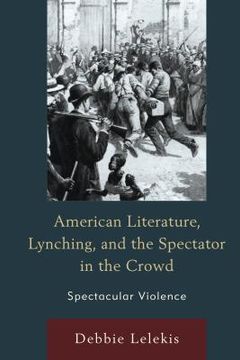Share
American Literature, Lynching, and the Spectator in the Crowd: Spectacular Violence (in English)
Debbie Lelekis
(Author)
·
Lexington Books
· Hardcover
American Literature, Lynching, and the Spectator in the Crowd: Spectacular Violence (in English) - Lelekis, Debbie
$ 117.71
$ 147.14
You save: $ 29.43
Choose the list to add your product or create one New List
✓ Product added successfully to the Wishlist.
Go to My WishlistsIt will be shipped from our warehouse between
Tuesday, July 02 and
Wednesday, July 03.
You will receive it anywhere in United States between 1 and 3 business days after shipment.
Synopsis "American Literature, Lynching, and the Spectator in the Crowd: Spectacular Violence (in English)"
American Literature, Lynching, and the Spectator in the Crowd: Spectacular Violence examines spectatorship in American literature at the turn of the twentieth century, focusing on texts by Theodore Dreiser, Miriam Michelson, Irvin S. Cobb, and Paul Laurence Dunbar. The spectator functions as a lens through which we view the relationship between violence and social change as depicted in the politically-charged crowds of fictional lynch mob scenes that expose the central tension of American democracy--the struggle for balance between the rights of the individual and the demands of the community. This has played out in American fiction through clashes between crowds and the primarily rural images that have so often been used to describe America. While this pastoral vision of America has dominated the study of American literature, this book argues for a reassessment of fiction that takes into consideration that the way the country defines itself collectively is as significant as the way its people define themselves individually. This study distinguishes itself from others by bringing together journalism, crowds, lynching, spectatorship, and literature in new and innovative ways that uncover how American literature at the turn of the twentieth century confronted and pushed beyond passive observation and static visual performances, which are traditionally associated with the terms "spectator" and "spectacle." The crowds in fictional lynch mob scenes clash with the idea of positive collective action because the crowd's vigilantism defies legitimate legal and democratic processes. Lynch mobs, in contrast to other crowds like strikes or political rallies, do not reclaim the democratic process from the control of the powerful and wealthy, but rather oppose those practices violently without regard to justice. As a figure who is simultaneously within and outside the crowd, the spectator (often in the form of a reporter character) is in a unique position to express the fractures occurring between the individual and the collective in American society. Racial conflicts are a key aspect of the crowd scenes examined. American writers contended with these issues by using the spectator to observe, question, and challenge readers to consider the impact on the structure of American society.

